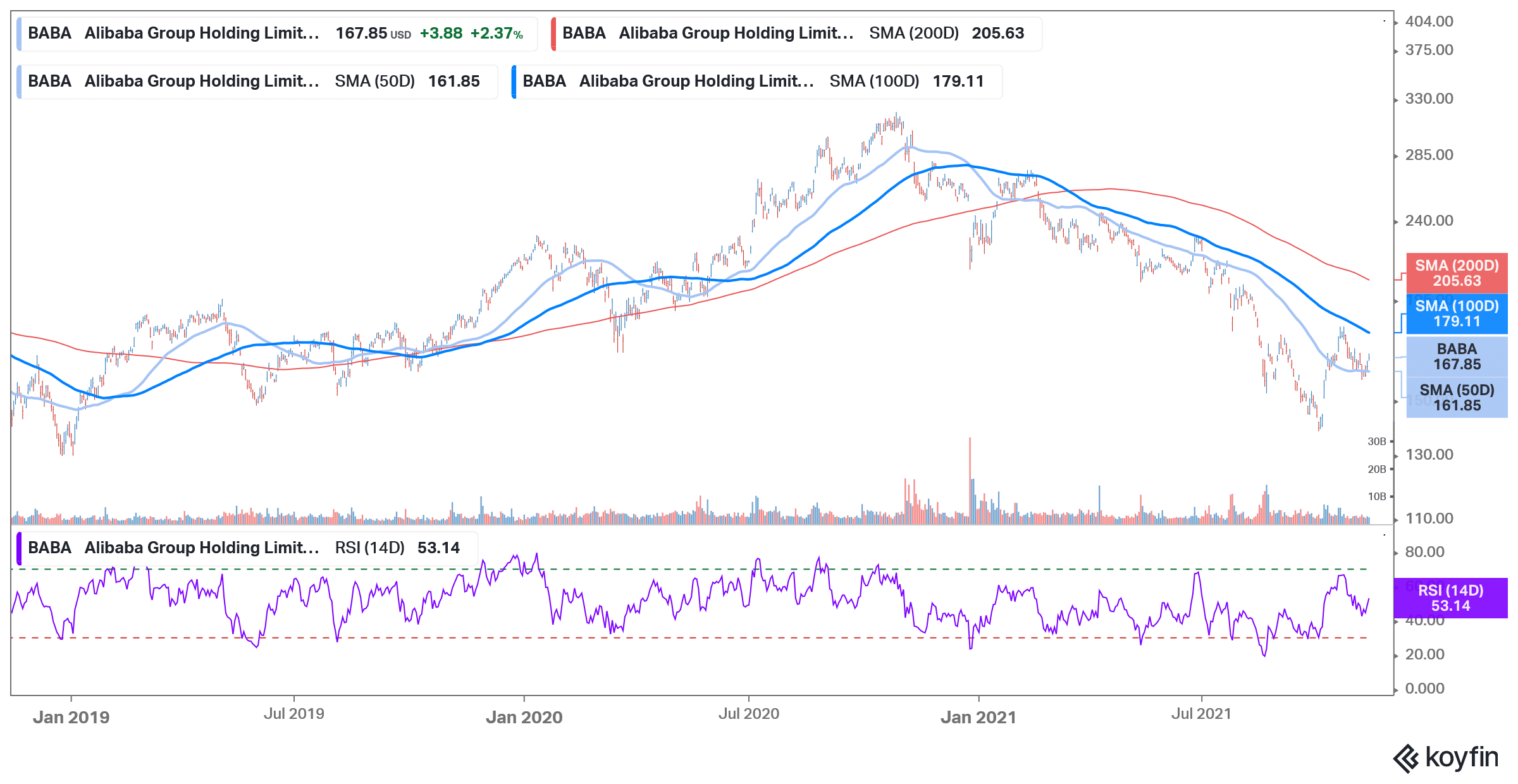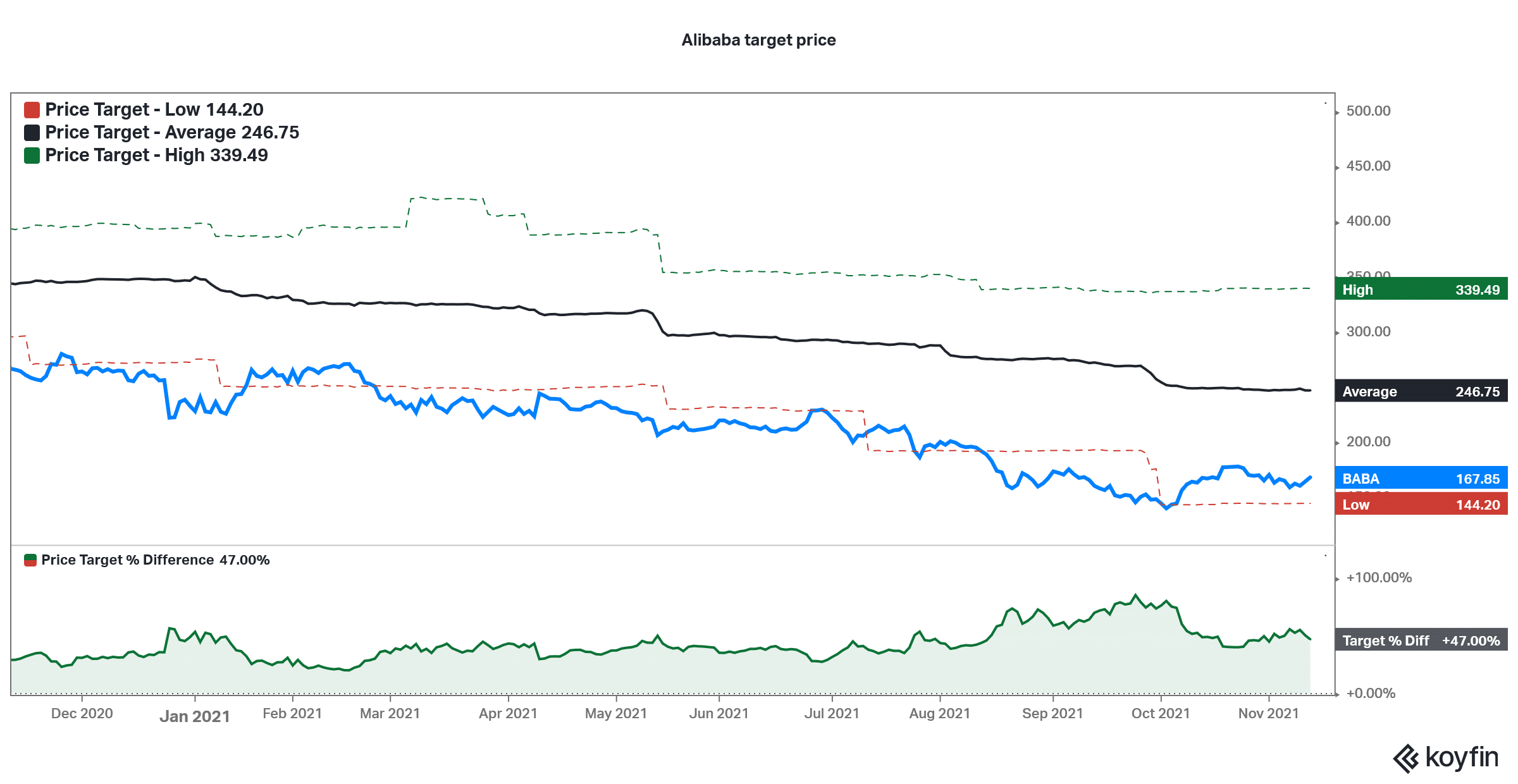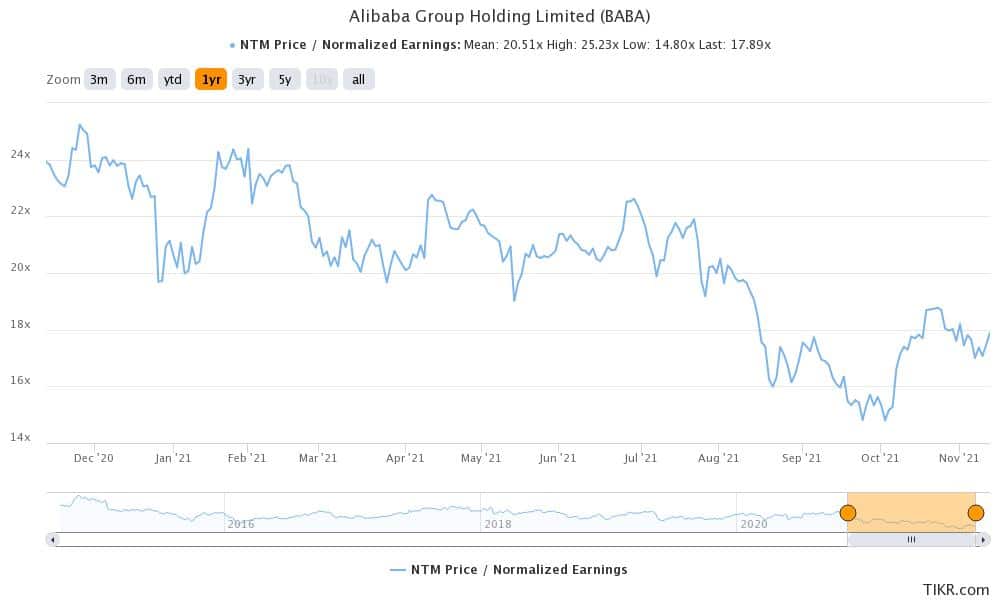Alibaba Stock Price Forecast November 2021 – Time to Buy BABA Stock?
Please note that we are not authorised to provide any investment advice. The content on this page is for information purposes only.
Alibaba (BABA) stock rose 2.4% in yesterday’s price action and has now bridged its YTD loss to around 26%. The stock has been under pressure over the last year and has underperforming global tech peers.
Meanwhile, BABA stock has recovered smartly from the 2021 lows amid a general belief that the worst is over for the company. What’s the forecast for Alibaba stock and is it a good buy in November 2021?
BABA stock technical analysis

Alibaba stock is looking mixed on the charts. It has crossed above the 50-day SMA (simple moving average) but is facing resistance at the 100-day SMA. The stock also trades below the 200-day SMA. However, its 14-day RSI is a neutral indicator.
68% of all retail investor accounts lose money when trading CFDs with this provider.
Alibaba stock recent developments
Alibaba has reported the sales for the annual Single’s Day annual shopping event. While sales hit a record high of $84.5 billion and increased 8.5% for the year, it was the slowest growth ever for the Chinese e-commerce giant. To put that in perspective, it had reported a sales growth of 26% in 2020 during the event despite the COVID-19 pandemic.
The Single’s Day is the single biggest shopping fest globally and is held in November every year after the idea was mooted by Alibaba’s co-founder Jack Ma in 2009. Analysts follow the sales figures for the event to get insights into the Chinese economy. The communist country has been gradually transforming from an investment-led to a consumption-led economy and its retail sales data are a key economic indicator.
BABA reports record Single’s Day sales
While BABA reported yet another record Single’s Day sales, it was the first time since the event began that the growth was in single digits. Here it is worth noting that apart from the general slowdown in China and the regulatory crackdown on tech companies, the tepid sales growth should also be seen in the context of the global supply chain and logistics problems. Companies have been losing out on revenues amid the supply chain issues, and Apple alone estimates that it lost $6 billion in revenues in the fiscal fourth quarter of 2021 due to the supply chain issues.
Meanwhile, Alibaba sounds upbeat over the performance. Yang Guang, vice president at Alibaba said “This 11.11 Global Shopping Festival, we delivered steady and quality growth that is a reflection of the dynamic Chinese consumption economy.” He added, “We also leveraged the power of 11.11 as a platform to fulfill our social responsibility. This year’s festival was a meaningful milestone as part of our commitment towards building a sustainable future.”
Here it is hard to not miss words like “social responsibility” in communication. China has cracked down on its tech giants and among others, it wants to address the wealth inequality in the country. Chinese President Xi Jinping is pushing forward his “common prosperity” agenda to address the glaring wealth and social inequality in the communist country.
Alibaba has been a prime target in China’s tech crackdown
Last year, Alibaba was the poster child of China’s tech crackdown. Last year, BABA’s co-founder Jack Ma had made critical comments about the country’s financial system. Post that, not only was the IPO of Ant Financial blocked by the Chinese government but Ma himself wasn’t seen in public for months. However, since then, the company has been making several overtures to the authorities.
It agreed to pay a $2.8 billion fine to settle the antitrust case. In September, Alibaba had announced that it would invest $15.5 billion by 2025 to promote common prosperity in China. The investment, which is voluntary, comes amid the push by the Communist government to address the growing wealth inequality in the country.

BABA stock forecast
Meanwhile, while some of the analysts have lowered Alibaba’s target price, the consensus projections are still quite bullish for the stock. Of the 47 analysts covering BABA stock, 41 have a buy rating. Five analysts have a hold rating while one analyst has a sell rating on the stock. The stock’s median target price is $237.07 which is a premium of 41.2% over current prices.
Several brokerages including Daiwa Capital Markets Hong Kong and Raymond James have raised concerns over a growth slowdown for Alibaba. To be sure, BABA is not the only e-commerce play witnessing a growth slowdown. Amazon has missed its revenue estimates for two consecutive quarters and has forecast tepid growth for the current quarter also.
Barclays is bullish on Alibaba stock
While several brokerages have turned bearish on BABA stock, earlier this month, Barclays took a contrarian approach and named the company a top Chinese stock to buy. “The recent selloff of China internet and tech companies has driven their valuations to the most attractive levels in recent memory, which we believe offers a good entry point for patient investors,” said Barclays in its note.
Commenting on BABA, it said, “We believe BABA offers one of the most compelling valuations not just among Chinese ADRs but global peers under Barclays’ coverage.” The brokerage has a $275 target price on Alibaba.

BABA stock long term forecast
Meanwhile, some observers, including Cathie Wood of ARK Invest believe that there would be a structural deterioration in the multiples of Chinese tech names. China’s tech crackdown has dented the long-term forecast for Chinese stocks like Alibaba. Also, the Chinese economy might not grow at the same pace as we saw in the previous five years. China’s tech crackdown coupled with the US-China rivalry has indeed led to structural deterioration in the valuations of Chinese companies.
But Alibaba looks like a good buy
That said, it is hard to overlook Alibaba stock amid the tepid valuations. BABA stock trades at an NTM (next-12 months) PE multiple of 17.9x which is much lower than global peers. Even if we apply a discount for the stock amid the regulatory crackdown in China, the risk-reward would appear attractive.






